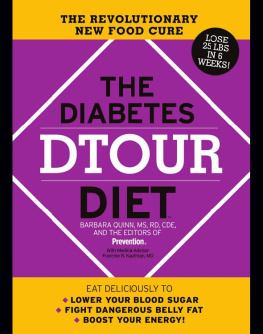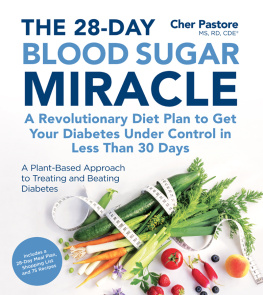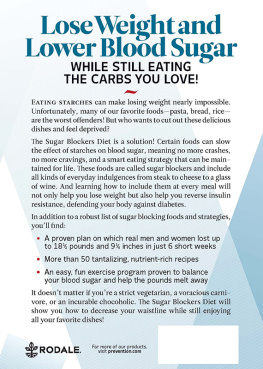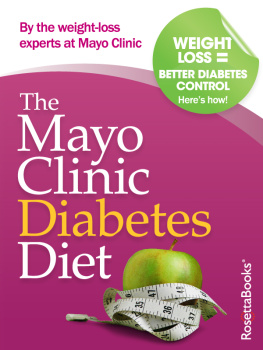R ight now, were thinking, you probably want to be anywhere but here. Being here means diabetes is touching your lifewhether youve been diagnosed with it or youre at risk for developing it because of high blood sugar. Whatever your story is, you realize that getting rid of those extra pounds can help you take a detour around diabetes, and you can be out loving your life instead of worrying about your blood sugar level.
So youre all set to do what you know you have to do. Except you love to eat. (Who doesnt?) You cant bear the thought of giving up your favorite foods. (Who could?) And you really, really dont want to feel hungry all the time. (Thats why so many diets fail in the first place!)
We hear you. And we promise, the Diabetes DTOUR Diet is going to be differentmuch different from any diet you may have tried in the past. You will lose weight. You will stabilize your blood sugar. And youll do it with food.
What weve found, through analysis of the scientific research as well as interviews with experts in diabetes and weight loss, is that certain foodsor, more precisely, certain nutrients in foodscan help melt away pounds, lower blood sugar, and reduce insulin resistance, one of the hallmarks of prediabetes (high blood sugar) and diabetes. We call these supernutrients our Fat-Fighting 4, and youre going to be reading a lot about them in the pages ahead. For now, just know that they are the foundation of the Diabetes DTOUR Diet; collectively, they can help you achieve significant and sustainable resultswithout ever going hungry or feeling deprived!
In fact, on DTOUR, you will:
1. Eat more foods more often. Were talking three meals and two snacks every day. Though you may be taking in fewer calories, youll never notice that theyre missing. The secret is choosing the foods that pack the most nutrientsincluding our fabulous Fat-Fighting 4into the fewest calories.
2. Enjoy all your favorites. French toast for breakfast? Pizza for lunch? Ice cream with chocolate syrup for a snack? Yes, yes, and yes! Food is truly your friend on DTOUR, from familiar comfort foods to intriguing new creations that tempt your taste buds. (Pesto Pizza, anyone?)
3. Develop a new food tude. When youre dealing with extra pounds around the middle or blood sugar that has a mind of its own, food just seems like nothing but trouble. After all, its what got you in a bind in the first place, right? But heres the thing: You need to eatso celebrate it! The trick is to choose the right foods in the right portions. Well show you how to do just that, because we know youre not looking for a temporary fix. On DTOUR, youll learn how to eat for life.
As we go along, well get into other factors that are important to achieving your weight and blood sugar goalsthings like ramping up your physical activity, managing your stress, and getting enough sleep. Watch for the road signs directing you to tips and tools that break these and other parts of the DTOUR plan into easy, manageable steps. Remember, though, that DTOUR is all about making great food your partner in good health. Were absolutely convinced that when it comes to losing weight and controlling blood sugar, food isnt the problemits the solution.

FYI
CURRENTLY, THERE ARE 1.6 billion overweight and 400 million obese adults on the planet, according to the World Health Organization. By 2015, those numbers will grow to 2.3 billion and 700 million, respectively.
WHY DIABETES, WHY NOW?
Before we get into the how of the Diabetes DTOUR Diet, lets take a moment to consider the whyas in, why this diet? And why now?
Diabetes is on the rise in the United States, and it shows no sign of letting up anytime soon. The latest data from the Centers for Disease Control and Prevention (CDC) suggest that as many as 24 million Americansa number equal to the population of Texashave some form of diabetes, the vast majority with type 2. According to the same report, another 57 million have prediabetes, which raises the risk for the full-blown disease. So wherever you are on the diabetes spectrum, you have plenty of company.
The good newsreally!is that type 2 diabetes is largely a lifestyle disease. Yes, genetics play a role, as do environmental factors. (Well say more about this in Chapter 2.) But lifestyle is what tips the scale in one direction or the othertoward disease or toward health. For example, overweight and obesity are powerful predictors of type 2. So is excess belly fat (as well discuss in Chapter 3).
Whats good about the fact that lifestyle plays such a big role? It means youre in charge! You can stop high blood sugar or prediabetes before it advances to full-blown diabetes. If you already have type 2, losing weight may help you avoid or delay the use of diabetes medications, not to mention reduce your risk of complications. If youre in the prediabetic stage, you may be able to head off diabetes altogether.
Both type 2 diabetes and prediabetes involve insulin resistance. As the name suggests, insulin resistance means that the muscle, liver, and fat cells dont properly use insulin, the hormone that helps usher glucose (sugar) from the bloodstream into cells. Once there, glucose is converted to energy. When cells are insulin resistant, glucose builds up in the bloodstream. Meanwhile, cells arent getting the fuel they need to carry out their basic functions.
In prediabetes, the pancreas secretes more insulin to try to sweep the extra glucose out of the bloodstream. Eventually, though, it just cant keep up. This marks the onset of type 2, which doctors diagnose at or above a fasting blood glucose level of 126 mg/dl.
If type 2 diabetes is the big show, then prediabetes is the dress rehearsal. It refers to higher-than-normal fasting blood glucose, in the range of 100 to 125 mg/dl. Though it isnt the full-blown disease, it can lay the groundwork for complications later on. All the more reason to take action now, before it has a chance to do harm.

Stop Here
MAKE A LIST! If you have diabetes, do this now: Create a list of your support teams telephone numbers and e-mail addressesprimary-care physician, nutritionist, pharmacistso youll be able to reach them quickly and easily if you have a question. Place a copy in your wallet and another by your home telephone. If you dont have a support team, talk to your doctor about assembling one.
Whether you have prediabetes or diabetes, your primary goal is to achieve what experts call good control. In other words, you want to get as close to a normal, nondiabetic blood glucose level as you safely can. You and your doctor should work together to determine what that level is for you. As a general guideline, those with diabetes should maintain their blood sugar level between 70 and 130 mg/dl before meals and below 180 mg/dl 2 hours after. For everyone else, a healthy goal is less than 140 mg/dl.
By the way, theres another number youll want to keep an eye on, and thats your A1c. Its a measure of your average blood glucose over the previous several months. Current guidelines recommend keeping your A1c at less than 7 percent.

FYI
OVERWEIGHT OR INSULIN-RESISTANT women are 50 percent more likely to be diagnosed with advanced-stage breast cancer, according to a 20-year study of more than 60,000 Swedish women. In the study, published in 2008 in the journal











